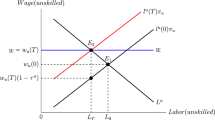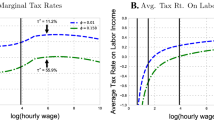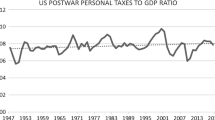Abstract
This paper generalizes the standard model of how taxes affect the labor-leisure choice by allowing individuals to change both their labor supply and avoidance effort in response to tax changes. Doing so reveals that the income and substitution effect of taxes depend on both preferences and the avoidance technology. Econometric analysis will not in general allow one to separately identify the two influences, unless one can specify observable determinants of the cost of avoidance. The effective marginal tax rate on working must be modified by the addition of an avoidance-facilitating effect, which measures how the cost of avoidance changes with higher income. This model provides a conceptual structure for evaluating to what extent, and in what situations, the opportunities for tax avoidance mitigate the real substitution response to taxation.
Similar content being viewed by others
References
Allingham, M. G. and A. Sandmo. (1972). “Income Tax Evasion: A Theoretical Analysis.” Journal of Public Economics 1, 323–338.
Auerbach, A. and J. Slemrod. (1997). “The Economic Effects of the Tax Reform Act of 1986.” Journal of Economic Literature 35, 589–632.
Christian, C. (1994). “Voluntary Compliance with the Individual Income Tax: Results from the 1988TCMPStudy.” IRS Research Bulletin, 1993/1994. Publication 1500, Washington, D.C.: Internal Revenue Service.
Cowell, F. A. (1985). “Tax Evasion with Labour Income.” Journal of Public Economics 26, 19–34.
Cowell, F. A. (1990). “Tax Sheltering and the Cost of Evasion.” Oxford Economic Papers 42, 231–243.
Cremer, H. and F. Gahvari. (1993). “Tax Evasion and Optimal Commodity Taxation.” Journal of Public Economics 50, 261–275.
Grubert, H. and J. Slemrod. (1998). “Tax Effects on Investment and Income Shifting to Puerto Rico.” Review of Economics and Statistics 80, 365–373.
Kaplow, L. (1990). “Optimal Taxation with Costly Enforcement and Evasion.” Journal of Public Economics 43, 221–236.
Mayshar, J. (1991). “Optimal Taxation with Costly Administration.” Scandinavian Journal of Economics 93, 75–88.
Okun, A. M. (1975). Equality and Efficiency: The Big Tradeoff. Washington, D.C.: The Brookings Institution.
Rosen, H. (1976). “Tax Illusion and the Labor Supply of Married Women.” Review of Economics and Statistics 58, 485–507.
Sandmo, A. (1981). “Income Tax Evasion, Labour Supply, and the Equity-Efficiency Tradeoff.” Journal of Public Economics 16, 265–288.
Slemrod, J. (1992). “Do Taxes Matter? Lessons from the 1980s.” American Economic Review 82, 250–256.
Slemrod, J. (1994). “Fixing the Leak in Okun's Bucket: Optimal Tax Progressivity when Avoidance Can be Controlled.” Journal of Public Economics 55, 41–51.
Slemrod, J. (1999). “Estimating System-Dependent Tax Elasticities: The Case of the Michigan Cigarette Tax Increase.” Mimeo. University of Michigan.
Usher, D. (1986). “Tax Evasion and the Marginal Cost of Public Funds.” Economic Inquiry 24, 563–586.
Yitzhaki, S. (1974). “A Note on 'Income Tax Evasion: A Theoretical Analysis'.” Journal of Public Economics 3, 201–202.
Yitzhaki, S. (1987). “On the Excess Burden of Tax Evasion.” Public Finance Quarterly 15, 123–127.
Author information
Authors and Affiliations
Rights and permissions
About this article
Cite this article
Slemrod, J. A General Model of the Behavioral Response to Taxation. International Tax and Public Finance 8, 119–128 (2001). https://doi.org/10.1023/A:1011204301325
Issue Date:
DOI: https://doi.org/10.1023/A:1011204301325




